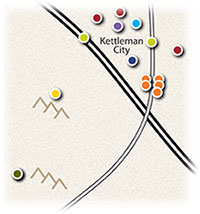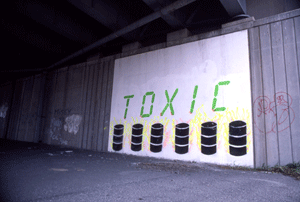In the small Latino farmworker community of Kettleman City, California, at least 11 babies in the past three years have been born with serious birth defects, and several infants have died. Residents blame the recent spate of tragedy on the vast hazardous-waste dump three miles from town. But Kettleman City has numerous environmental villains, including contaminated tap water, heavy air pollution, and daily toxic pesticide exposure. In fact, residents’ health is compromised in so many ways that Rachel Morello-Frosch, an environmental health researcher at UC-Berkeley, calls Kettleman City “a poster child for cumulative impacts.” You can read the full story here, or view a photo essay exploring the tragic impact of cumulative pollutants on Kettleman City families.
|
Interstate 5 and State Route 41 Each day up to 400 semitrucks pass within 4 miles of residential homes in Kettleman City. Nearly 100 trucks, some of them bearing toxic waste, roll directly through town on State Route 41. Farms The state of California is investigating possible links between pesticide exposure and Kettleman City’s birth defects. Waste Management landfill The largest hazardous-waste dump west of the Mississippi stores asbestos, pesticides, and petroleum products, as well as PCB-contaminated wastes, which the EPA suspects may be linked to birth defects. A recent EPA investigation found PCBs in the soil (PDF) outside a storage building and concluded that Waste Management had improperly disposed (PDF) of waste. |

Gas fumes The California EPA says pollution from gas stations—there are 5 in the town of 1,500—could be linked to the birth defects. Petroleum deposits Potential contamination from oil and gas drilling in the Kettleman Hills includes toluene, which has been linked to birth defects. |
Food desert Cleft palates and neural tube defects are associated with deficiency in the vitamin folic acid, which is found in leafy green vegetables as well as fortified baked goods and cereals. Some researchers suspect diet might be a factor in the Kettleman City mystery. Contaminated tap water Kettleman City’s two municipal wells contain what the California EPA calls “elevated levels” of arsenic and benzene, both carcinogens that are also suspected of causing birth defects. California Aqueduct The state Department of Toxic Substances Control is testing the aqueduct for toxic chemicals; some Kettleman residents eat fish (PDF) from the waterway. |











